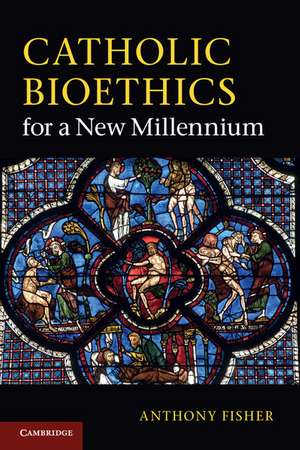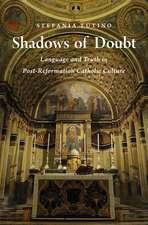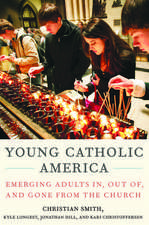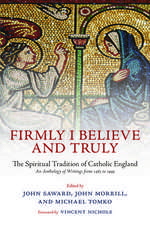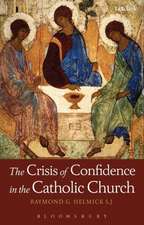Catholic Bioethics for a New Millennium
Autor Anthony Fisheren Limba Engleză Paperback – 16 noi 2011
| Toate formatele și edițiile | Preț | Express |
|---|---|---|
| Paperback (1) | 276.77 lei 43-57 zile | |
| Cambridge University Press – 16 noi 2011 | 276.77 lei 43-57 zile | |
| Hardback (1) | 688.19 lei 43-57 zile | |
| Cambridge University Press – 16 noi 2011 | 688.19 lei 43-57 zile |
Preț: 276.77 lei
Nou
Puncte Express: 415
Preț estimativ în valută:
52.96€ • 55.43$ • 44.08£
52.96€ • 55.43$ • 44.08£
Carte tipărită la comandă
Livrare economică 31 martie-14 aprilie
Preluare comenzi: 021 569.72.76
Specificații
ISBN-13: 9780521253246
ISBN-10: 0521253241
Pagini: 344
Dimensiuni: 153 x 227 x 15 mm
Greutate: 0.61 kg
Editura: Cambridge University Press
Colecția Cambridge University Press
Locul publicării:Cambridge, United Kingdom
ISBN-10: 0521253241
Pagini: 344
Dimensiuni: 153 x 227 x 15 mm
Greutate: 0.61 kg
Editura: Cambridge University Press
Colecția Cambridge University Press
Locul publicării:Cambridge, United Kingdom
Cuprins
Abbreviations; Preface; Introduction; Part I. How Are We to Do Bioethics?: Section 1. Context: Challenges and Resources of a New Millennium: 1. Sex and life in post-modernity; 2. Catholic engagement with the culture of modernity; 3. Promising developments; 4. Conclusion; Section 2. Conscience: The Crisis of Authority: 5. The voice of conscience; 6. The voice of the magisterium; 7. Conscience in post-modernity; 8. Where to from here?; Section 3. Cooperation: Should We Ever Collaborate with Wrongdoing?: 9. Traditional example; 10. Five modern examples; 11. Some fundamental issues raised by these examples; 12. Why it matters so much; 13. Conclusion; Part II. Beginning-of-Life: Section 4. Beginnings: When Do People Begin?: 14. Method, thesis and implications; 15. A closer look at Ford's science; 16. A closer look at Ford's philosophy; 17. Individuality criteria; 18. Conclusions; Section 5. Stem Cells: What's All the Fuss About?: 19. Scientific potential and concerns about stem cells; 20. Ethical concerns about embryonic stem cells; 21. Social concerns about embryonic stem cells; Section 6. Abortion - and the New Eugenics: 22. The perennial debate about abortion; 23. Pre-natal screening: a search and destroy mission?; 24. The new abortion debate; Part III. Later Life: Section 7. Transplants: Bodies, Relationships and Ethics: 25. Love beyond death; 26. Conceptions of the body and relationships in organ transplantation; 27. Fashionable bioethical approaches to organ procurement; 28. Better bioethical approaches to organ procurement; 29. Ethical issues in organ reception; 30. Conclusion; Section 8. Artificial Nutrition: Why do Unresponsive Patients Matter?: 31. Civilisation after Schiavo?; 32. Why the unresponsive still matter: a philosophical account; 33. Why the unresponsive still matter: a theological account; 34. Some final questions; Section 9. Endings: Suicide and Euthanasia in the Bible: 35. The problem of suicide and euthanasia in the Bible; 36. Suicides and euthanasias in the Bible; 37. The Scriptural basis of Judeo-Christian opposition to suicide and euthanasia; Part IV. Protecting Life: Section 10. Identity: What Role for a Catholic Hospital?: 38. A tale of two hospitals; 39. Current challenges for Catholic hospitals; 40. Catholic hospitals as diakonia; 41. Catholic hospitals as martyria; 42. Catholic hospitals as leitourgia; 43. Conclusion: six tasks for a new century; Section 11. Regulation: What Kinds of Laws and Social Policies?: 44. A tale of three politicians; 45. Catholic principles for politicians; 46. Reasonable stances for a pro-life politician; 47. Some virtues of a pro-life politician.
Recenzii
'A work of excellent and accessible scholarship. A clear, coherent and contemporary treatment of bioethics in the Catholic tradition. Highly recommended to anyone interested in bioethics, Catholic or secular.' John Keown, Rose F. Kennedy Professor of Christian Ethics, Georgetown University, Washington DC
'These chapters show how the resources of the Catholic moral tradition can be brought to bear on novel and difficult bioethical problems. They will be of great use not least for those who wish to engage with a range of perspectives before coming to their own conclusions. I could think of no better or more thoughtful introduction to the discipline of Catholic bioethics.' Professor David Albert Jones, Director of the Anscombe Bioethics Centre
'Bishop Anthony Fisher's Catholic Bioethics for a New Millennium provides coherent and comprehensive coverage of many of the most disputed topics in bioethics. With both clarity and charity, Bishop Fisher dispels the myths and misunderstandings that obscure inherent dignity of the human person. He shows the compatibility of faith and reason and ably defends Catholic teaching against critiques from both dissenting theologians and secular philosophers.' Christopher Kaczor, Loyola Marymount University
'… serves as a wonderful example of the very best of theological and philosophical reflection on contemporary issues of interest.' The Tablet
'… this is a fine work on a variety of questions in Catholic bioethics … Fisher is clearly an articulate evangelical witness for the 'gospel of life', and an intellectually formidable exponent of the Catholic tradition. This is an extraordinarily fine treatment of a John Paul ll approach to bioethics.' The Thomist
'These chapters show how the resources of the Catholic moral tradition can be brought to bear on novel and difficult bioethical problems. They will be of great use not least for those who wish to engage with a range of perspectives before coming to their own conclusions. I could think of no better or more thoughtful introduction to the discipline of Catholic bioethics.' Professor David Albert Jones, Director of the Anscombe Bioethics Centre
'Bishop Anthony Fisher's Catholic Bioethics for a New Millennium provides coherent and comprehensive coverage of many of the most disputed topics in bioethics. With both clarity and charity, Bishop Fisher dispels the myths and misunderstandings that obscure inherent dignity of the human person. He shows the compatibility of faith and reason and ably defends Catholic teaching against critiques from both dissenting theologians and secular philosophers.' Christopher Kaczor, Loyola Marymount University
'… serves as a wonderful example of the very best of theological and philosophical reflection on contemporary issues of interest.' The Tablet
'… this is a fine work on a variety of questions in Catholic bioethics … Fisher is clearly an articulate evangelical witness for the 'gospel of life', and an intellectually formidable exponent of the Catholic tradition. This is an extraordinarily fine treatment of a John Paul ll approach to bioethics.' The Thomist
Notă biografică
Descriere
A groundbreaking contribution to bioethics bringing classical and contemporary wisdom to the dilemmas of life and love, health and healthcare.
